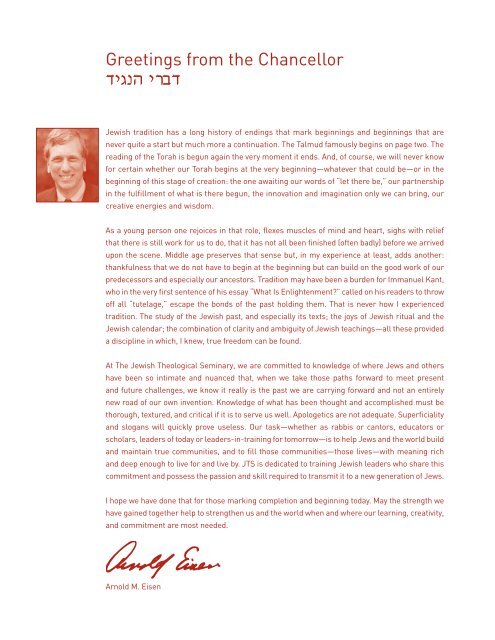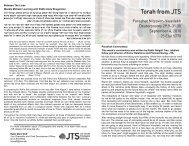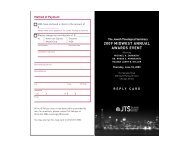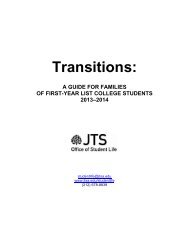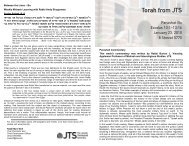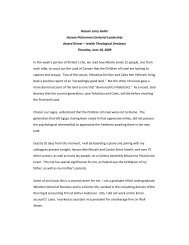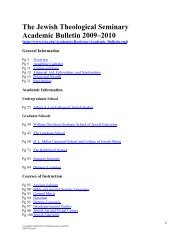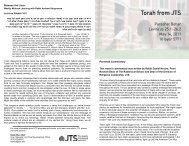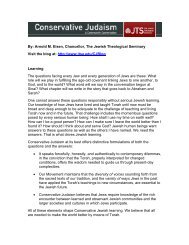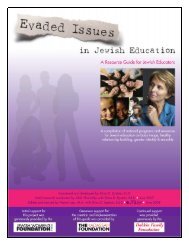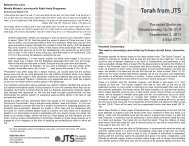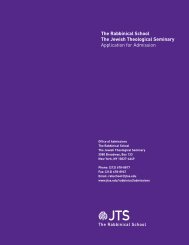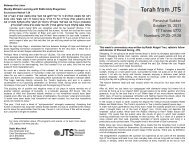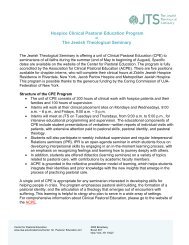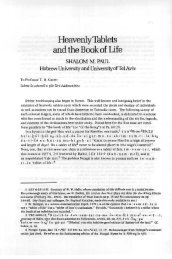117th Commencement Exercises May 19, 2011 - The Jewish ...
117th Commencement Exercises May 19, 2011 - The Jewish ...
117th Commencement Exercises May 19, 2011 - The Jewish ...
Create successful ePaper yourself
Turn your PDF publications into a flip-book with our unique Google optimized e-Paper software.
Greetings from the Chancellor<br />
דברי הנגיד<br />
<strong>Jewish</strong> tradition has a long history of endings that mark beginnings and beginnings that are<br />
never quite a start but much more a continuation. <strong>The</strong> Talmud famously begins on page two. <strong>The</strong><br />
reading of the Torah is begun again the very moment it ends. And, of course, we will never know<br />
for certain whether our Torah begins at the very beginning—whatever that could be—or in the<br />
beginning of this stage of creation: the one awaiting our words of “let there be,” our partnership<br />
in the fulfillment of what is there begun, the innovation and imagination only we can bring, our<br />
creative energies and wisdom.<br />
As a young person one rejoices in that role, flexes muscles of mind and heart, sighs with relief<br />
that there is still work for us to do, that it has not all been finished (often badly) before we arrived<br />
upon the scene. Middle age preserves that sense but, in my experience at least, adds another:<br />
thankfulness that we do not have to begin at the beginning but can build on the good work of our<br />
predecessors and especially our ancestors. Tradition may have been a burden for Immanuel Kant,<br />
who in the very first sentence of his essay “What Is Enlightenment?” called on his readers to throw<br />
off all “tutelage,” escape the bonds of the past holding them. That is never how I experienced<br />
tradition. <strong>The</strong> study of the <strong>Jewish</strong> past, and especially its texts; the joys of <strong>Jewish</strong> ritual and the<br />
<strong>Jewish</strong> calendar; the combination of clarity and ambiguity of <strong>Jewish</strong> teachings—all these provided<br />
a discipline in which, I knew, true freedom can be found.<br />
At <strong>The</strong> <strong>Jewish</strong> <strong>The</strong>ological Seminary, we are committed to knowledge of where Jews and others<br />
have been so intimate and nuanced that, when we take those paths forward to meet present<br />
and future challenges, we know it really is the past we are carrying forward and not an entirely<br />
new road of our own invention. Knowledge of what has been thought and accomplished must be<br />
thorough, textured, and critical if it is to serve us well. Apologetics are not adequate. Superficiality<br />
and slogans will quickly prove useless. Our task—whether as rabbis or cantors, educators or<br />
scholars, leaders of today or leaders-in-training for tomorrow—is to help Jews and the world build<br />
and maintain true communities, and to fill those communities—those lives—with meaning rich<br />
and deep enough to live for and live by. JTS is dedicated to training <strong>Jewish</strong> leaders who share this<br />
commitment and possess the passion and skill required to transmit it to a new generation of Jews.<br />
I hope we have done that for those marking completion and beginning today. <strong>May</strong> the strength we<br />
have gained together help to strengthen us and the world when and where our learning, creativity,<br />
and commitment are most needed.<br />
Arnold M. Eisen


